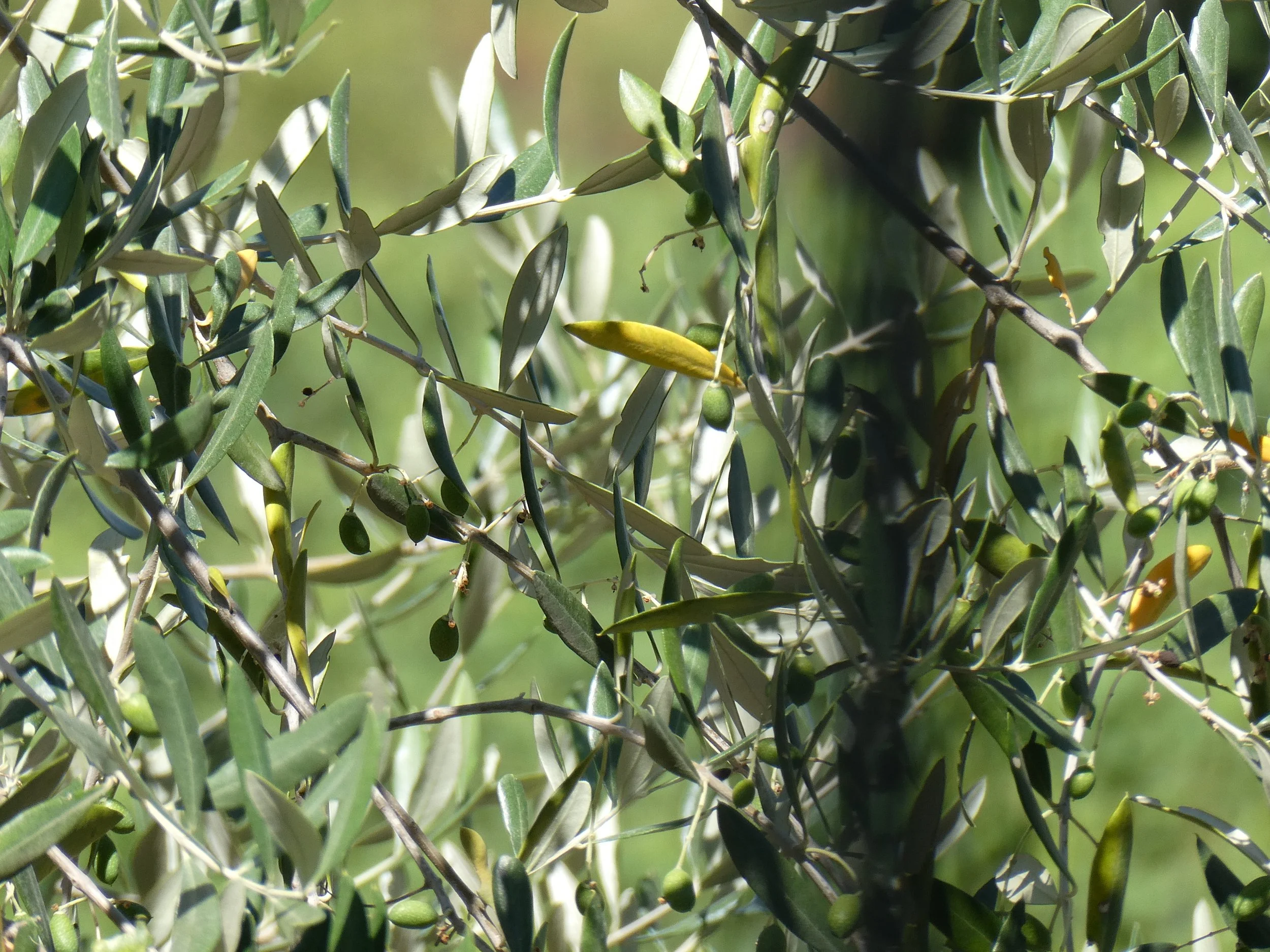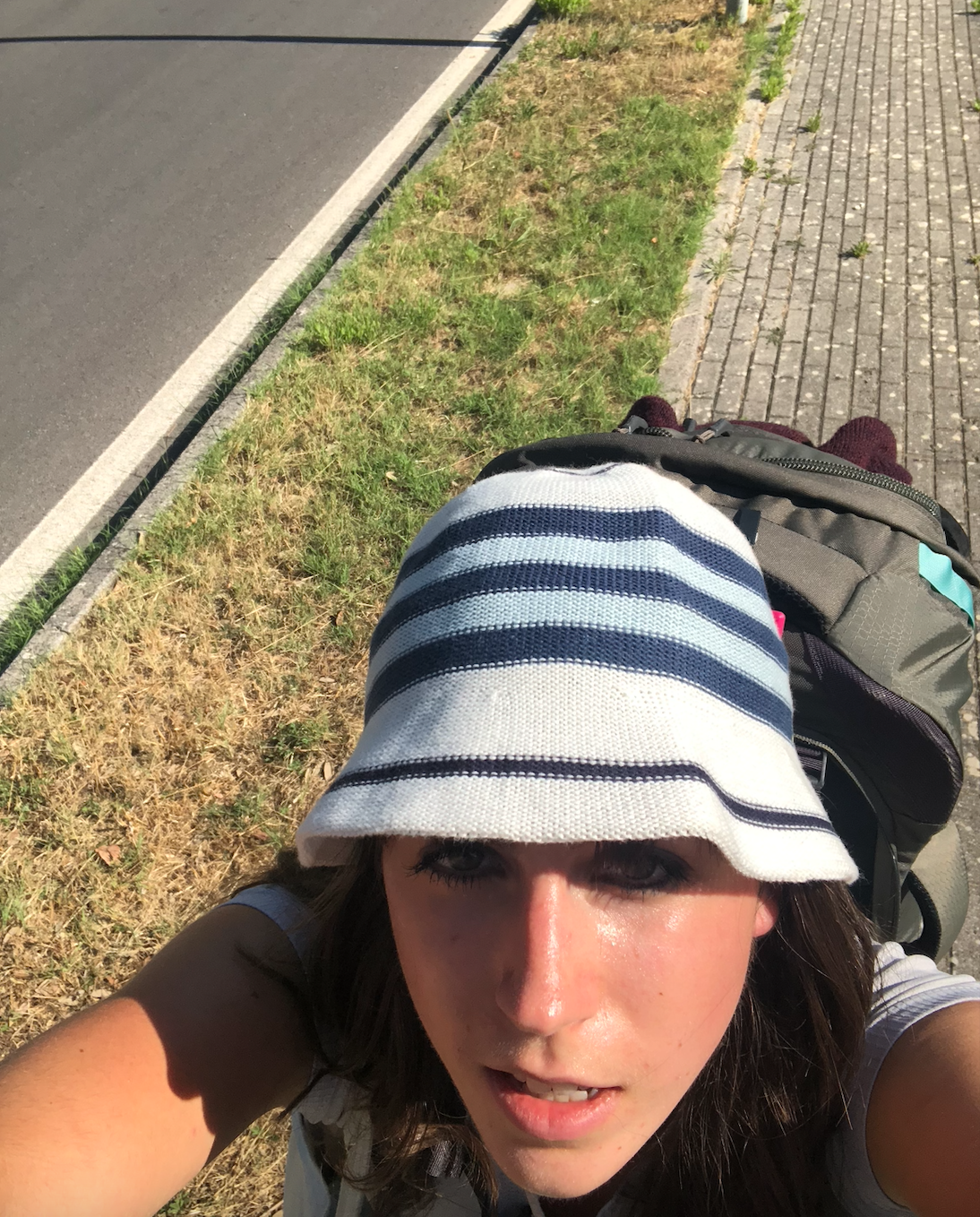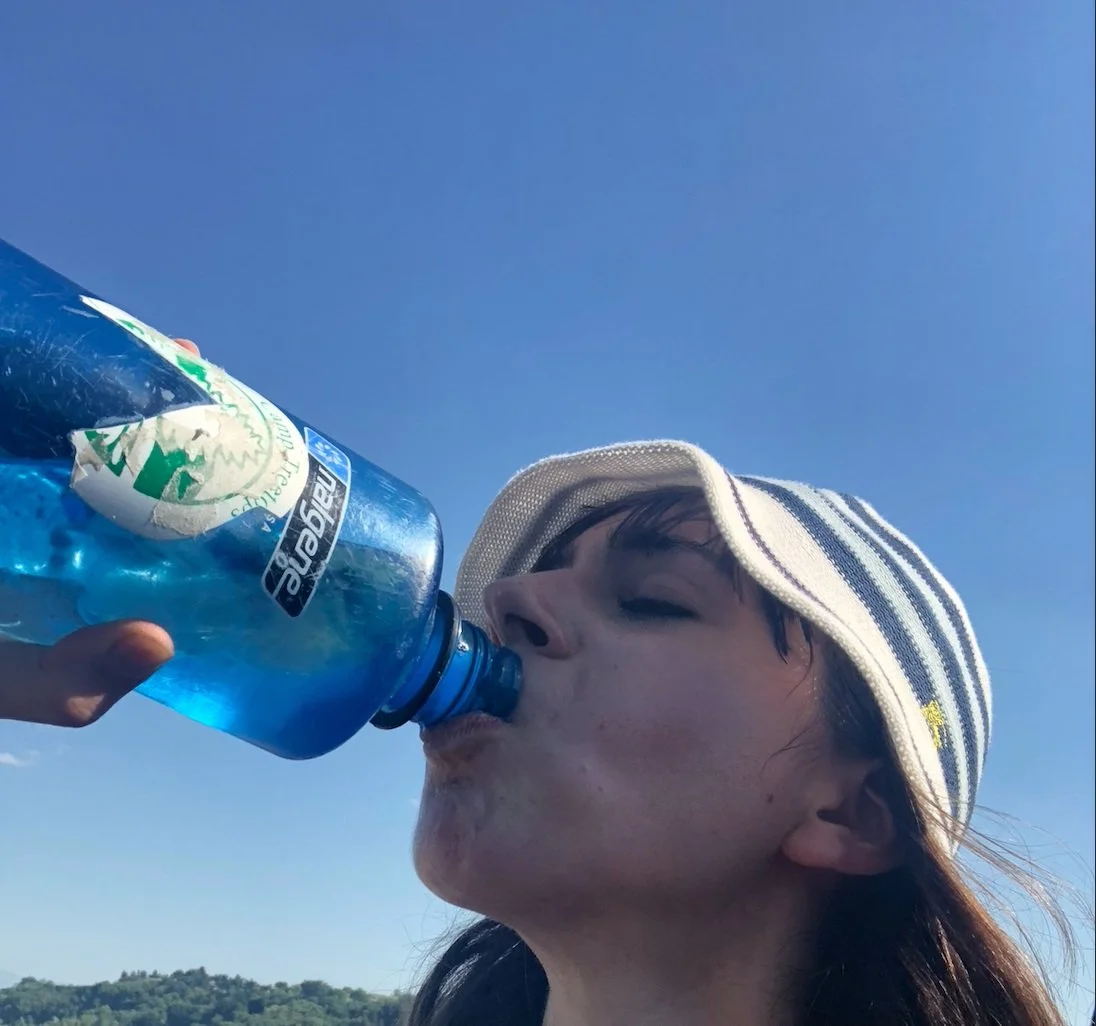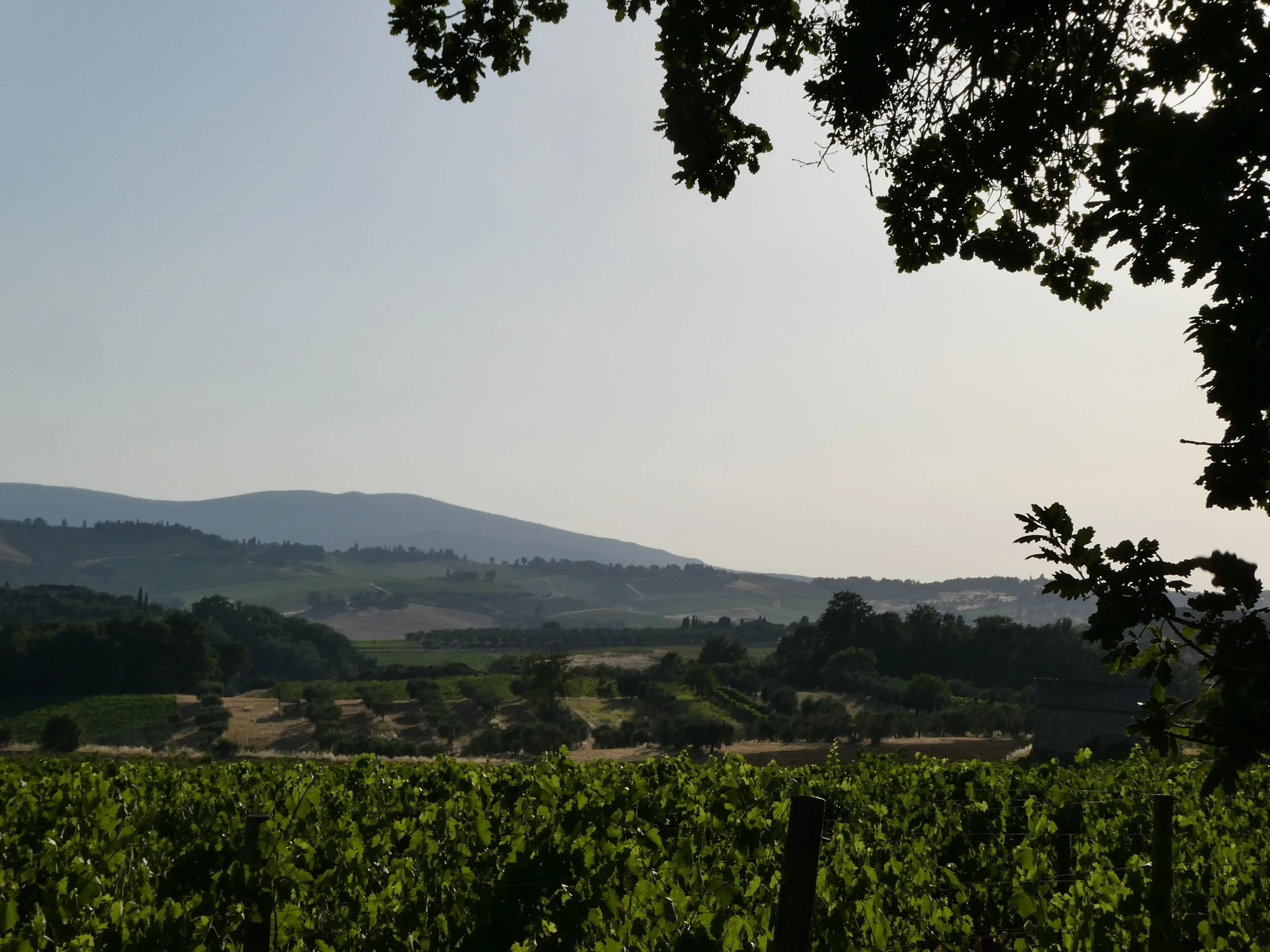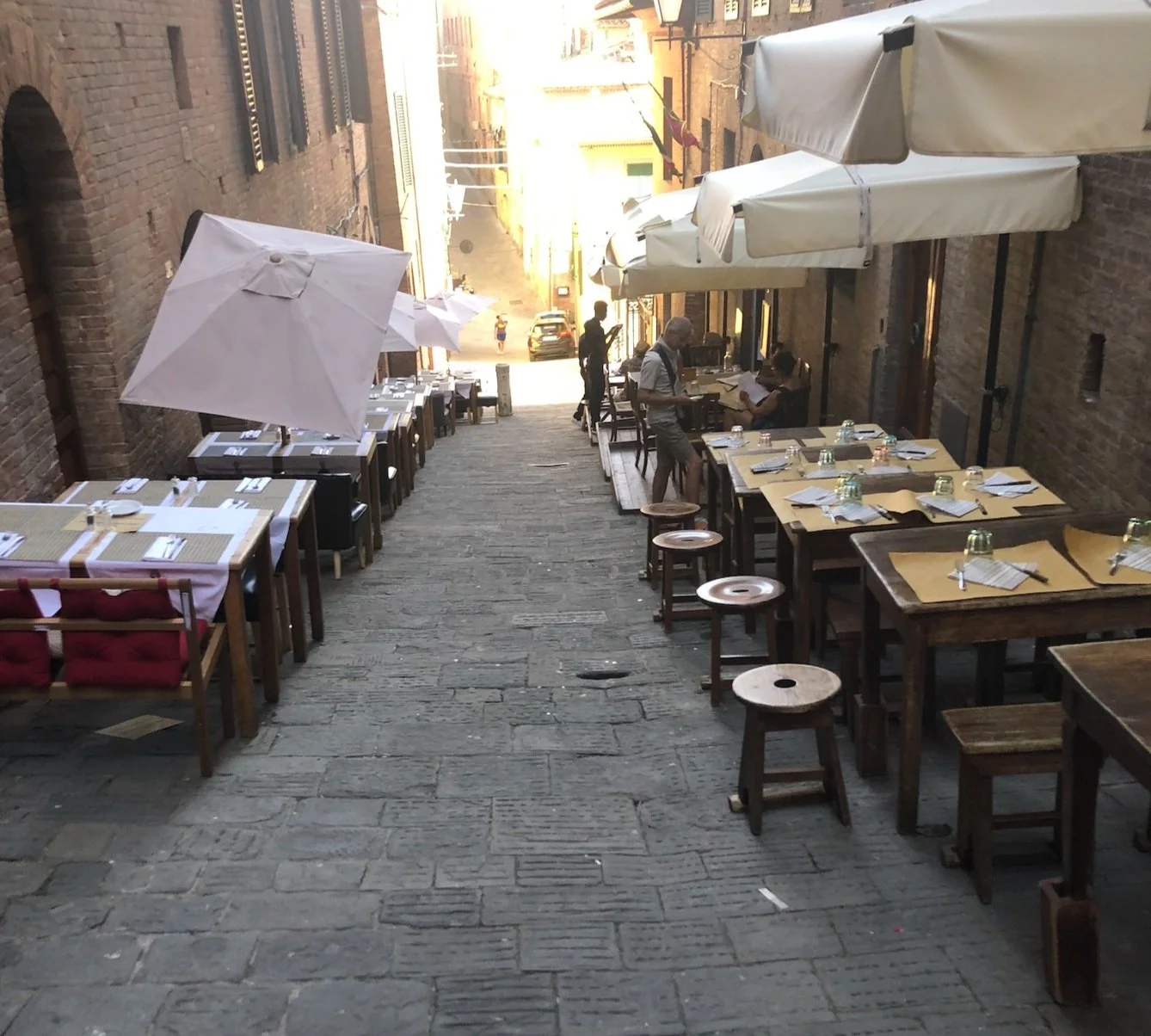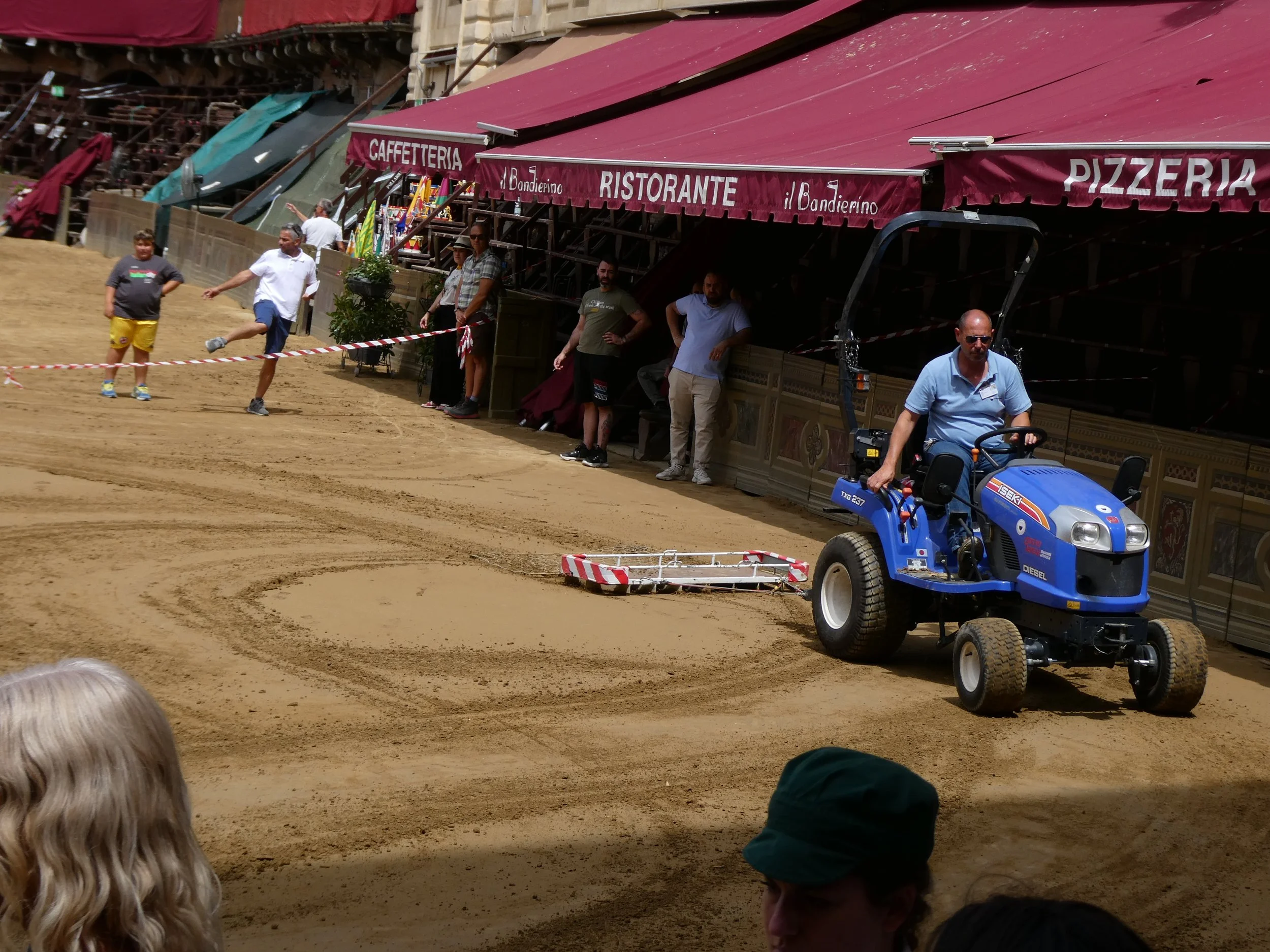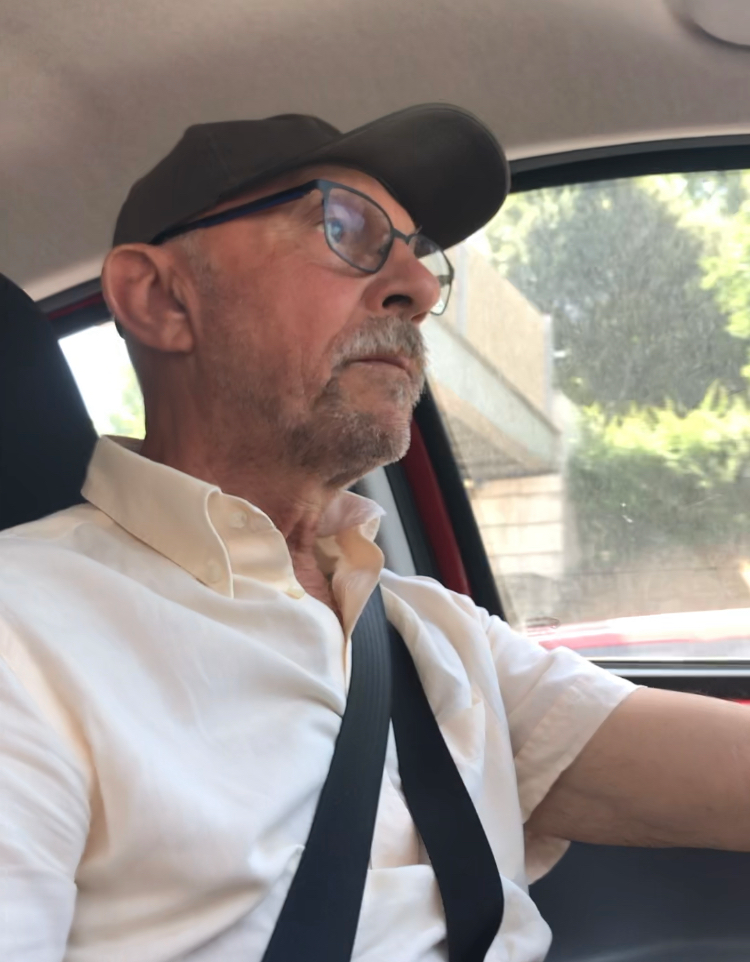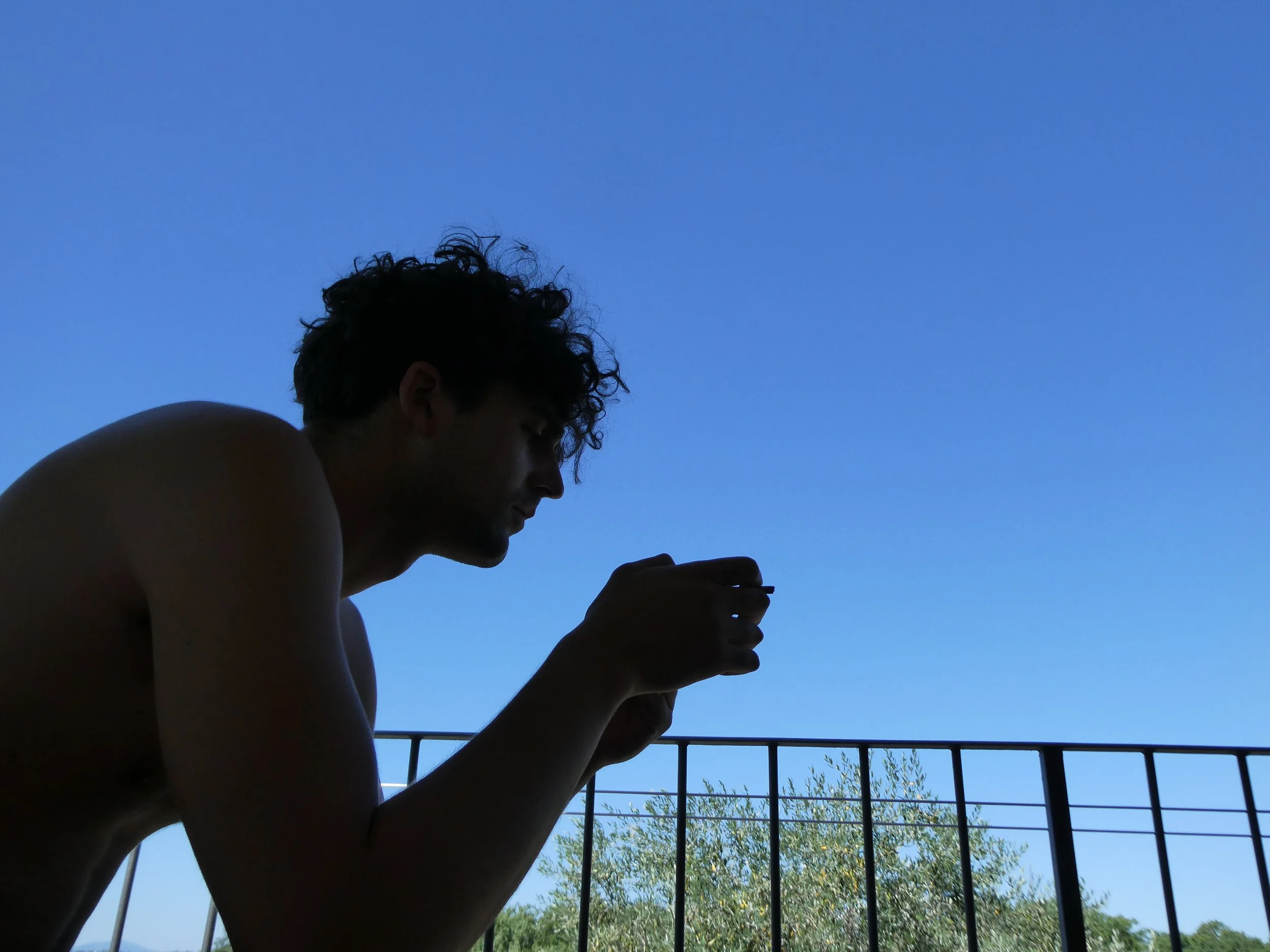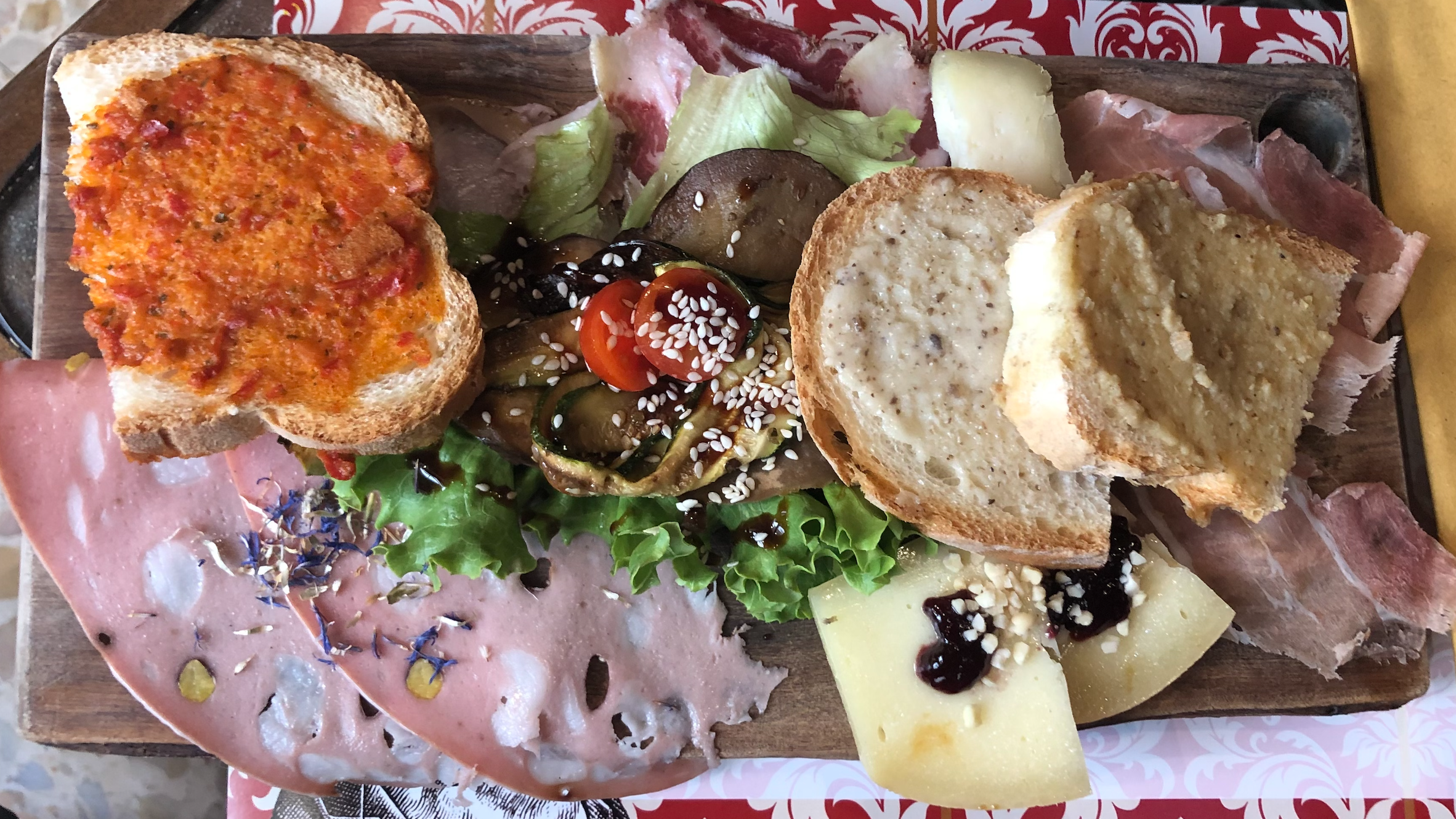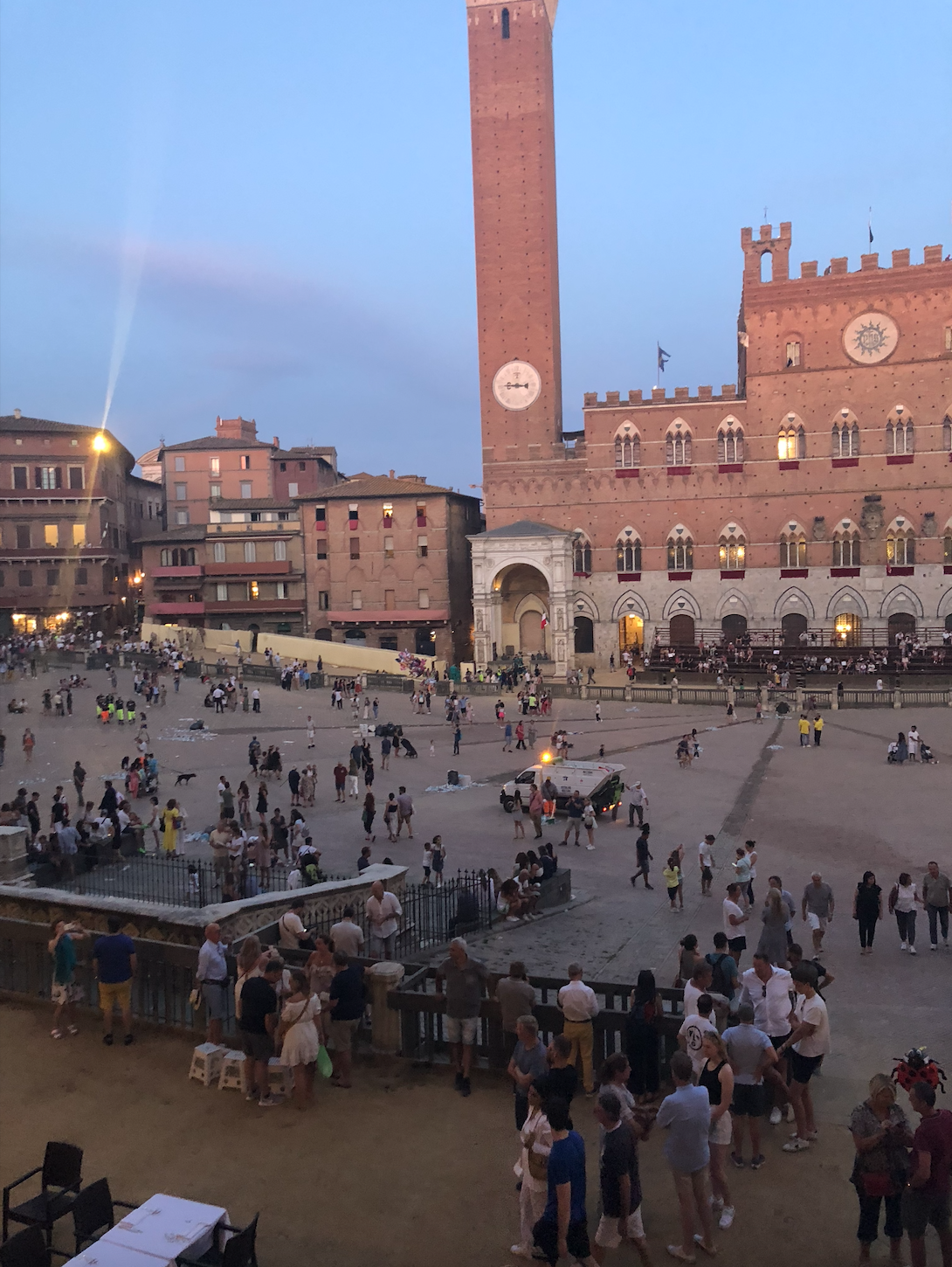Siena
A photo from my last morning in Florence.
I’ll explicate: The figure is perched at the very edge of a ledge that sticks out from a bridge over a canal, in their last instant before presumably walking off and falling reasonably far down into the water. It is a cool transitionary image — the sureness of the figure juxtaposed with the yellow-phased traffic light behind, that is conspicuously out of their line of sight. Whether the instruction to slow is known to the figure is unbeknownst to us.
The street lamp just left of the center that shares an edge with that traffic light kind of recalls the figure. Therefore it asserts itself as especially stationary and passive while comparatively the figure looks all the more overpowering. It would be effortlessly commanding if it were the only object of stature in the scene.
And there is another traffic light behind the figure’s head whose status is not visible to any of us. It lines up neatly with the curve of the figure’s neck and skull. It looks like it is pushing the figure forward — giving the sense that a sheer force of directionality, a passion of ambition, is so strong within the figure that external forces, even those unseen, are employed as magnets bending themselves for the cause.
In case my metaphor is a bit opaque, I am trying to use this image to describe my transitory state of leaving Florence, and how that set me up for Siena. I was driven by a pristine level energy, but the addition of transition, the effect of which on me is often extreme in whatever direction, turned that energy so encompassing that I felt like it was compiled together by the world just for me. Like the figure, I didn’t sense any reason to slow down. I was likewise bound for the edge of the ledge, and I’ll never know if I was aware that I was to imminently fall (delusional with invincibility), or if I was blind altogether. Always a retrospective question about such times.
But such a scenario of nonconsensually falling into a body of water is not so simple as falling from order into disorder, or from control into lack of control. If we as creatures who respond to stimuli find ourselves unprecedentedly in some foreign gulf, we will at least try adapt, and without consideration: move differently, breathe differently, adjust our priorities. So, falling into the water is far more complicated than falling to break one’s bones. And if anything, such a scenario might induce a temporary high, induced by both the new reactions and by the shock. For a while one would be cruising on adrenaline, and it would be the moment of actually getting to shore that would finally present all of the exhaustion, damages, and if applicable, trauma.
I arrived in Siena prepared for a difficult journey to the bed and breakfast where I would stay (there aren’t really any hostels there), which was pretty remote outside the city. First I walked in loops for a while trying to find my bus. When I finally found, boarded, and exited that one to transfer to my next bus, I realized there was absolutely no indication of the bus stop I needed. I asked a family for help who didn’t know English nor the area, then I asked a man who told me in some hybrid Italian-Spanish (we determined that I’d be able to understand more of his limited Spanish than his Italian, so we might as well utilize substitution where it might assist) that I had to go back to the train station at which I had arrived on the train and subsequently left via the bus. He provided me with obscure directions that got me exactly a block and a half, until I realized that any further move would be arbitrary.
Then I asked this woman for help, who either did not catch on that I couldn’t comprehend a word of hers, or didn’t care, because she went babbling on with profuse limb motions, and all I could do was nod, make confused and perplexed faces, and say sí or ok. At last I ended up walking alongside her when I finally figured out that she was saying she was walking in the same direction as the train station. I believe she was also talking about how I was crazy to be wearing a hat in sun bright sun, and to that I laughed and said sí sí.
This lady proved to be my first saving grace of the Siena era. I remember recognizing and appreciating the significance of it, I guess because these kinds of interactions haven’t come up much. With google maps almost always sufficient there isn’t often a need for these simple extensions of kindness, nor with google translate much opportunity for the satisfaction of overriding the language barrier.
At last I ended up back at the main station and learned that I’d have to walk to the city center, which was a substantial distance, to get the bus I actually needed. At the stop there was a woman waiting who told me that I could take the bus that she was taking — though it turned out that when I confirmed with the bus driver, he threw his hands up and spoke incomprehensibly, clearly conveying that this was not the bus to Ponte a Bozzone, that he had no idea how to help me, and that he couldn’t care less either. Then an English speaking woman on the bus stood up and yelled “S38!” Not that I had much faith in her word at this point, but I appreciated it and resumed waiting in the truly excessive heat. I must clarify that I was, surprisingly, not feeling very frustrated during this whole ordeal, and in fact I felt like I was exercising a new muscle. — the Dealing With Foreign Public Transport muscle. I guess that to be calm with transit situations requires from me a generally huge excess of energy.
At last the S38 came, (and at last my phone had recommended it) and I waved three of my limbs to flag it down. And what a beautiful ride it was, curving precisely along the google maps indicated route, my blue dot progressing steadily. Upon getting out, it indicated that I needed to walk about a mile and a half, which soon became clear was up an immense hill. However I was relatively joyous the whole time because I was past the tedious part of figuring out transport, and I had one of those adventurous but predictable ordeals ahead that one only really has in these kinds of traveling.
(I do think I have been developing my specifically Women’s Osprey Fairview 55 muscles. Trekking with the bag has definitely gotten easier.)
Big gains little progress, proportionally.
Shade break.
When I was planning this trip, I spent a lot of time staring at maps of Europe and brainstorming potential paths, rather than choosing places and then compiling them into an itinerary. I liked that prospect of conjoining “randomness” and practicality.
When one of my English professors suggested that I go to Siena, and, if possible, to the famous Palio, and I realized that the date aligned quite perfectly with the trajectory I had in mind at the time, I decided that I absolutely had to attend this horse race, and therefore that I had to go to Siena.
The Palio is a horse race that takes place in the city’s main piazza, the Piazza de Campo, every June and August of every year. The piazza is large enough to hold the race track, an absolutely unruly mass of spectators inside its perimeter, and some wooden benches around the perimeter for civilized seating (each seat apparently costs hundreds of dollars.)
Vineyard in the foreground
When at last I arrived at the bed and breakfast, sweating profusely, I was greeted by an extremely verbose small Italian lady who acted like she had been waiting for me her whole life, and was absolutely shocked that I had walked all the way up the hill, insisting I should have called. Yeah, I guess I could have done that. I always forget those kinds of options. I insisted that I love walking and she gradually calmed down.
She showed me how all of the light switches worked, how to adjust the awning on the porch, how to flush the toilet (granted, it was of a European style I had not yet utilized), and when I mentioned my interest in the Palio, she ran out of the room and returned with four pamphlets, explaining the various contradas and the history and traditions.
There is a total of 17 contradas in Siena, which are much like tribes. Each one has a representative animal, such as the tortoise, the snail, the jaguar, the unicorn. Only 10 out of the 17 contradas participate in a given Palio, but it is ensured that each one competes at least once each year. Each contrada also has an enemy contrada; for instance, the tortoise and the snail are enemies. The woman of the couple who owns the bed and breakfast, Nada, belongs to the tortoise contrada. She explained that since they were not competing in this Palio, her only concern was that the snail did not win. This system of enemies traces back to centuries ago, and no one seems to know how they came to be.
I went into Siena early the next morning, and almost immediately upon walking through one of the gates into the city (the city is surrounded by walls) I felt all of the little dormant morsels of dread inside of me join forces, so that once again I felt that familiar dense pit. I can’t account for this unfortunate shift; mainly I just felt startlingly unstable in my loneliness. It was a daunting though subtle fall from where I had been, kind of tentative, which is why I describe the mental shift it as dread instead of catastrophe.
The energy of the city on the day before before the Palio was very conspicuous, like nothing I’ve encountered. There was the subdued, private sense of build-up that forms before very certain kinds of events — High Holy Day services are actually the most apt example I can think of. Then there was the rumbling vivacity that accompanies a big sporting event; it was comparable to a huge density of football fans that is simultaneously adversarial and comradely (the comradeship can be so fleetingly heartwarming to outsiders — I love it.) And then there was an overall cohesive pride that was not at all appropriating like pride can sometimes be, and it was intriguing though unfortunately not welcoming. And of course the whole thing will forever be incredibly romantic. I felt like an imposter inside a centuries’ old refined niche.
A street claimed by the unicorn contrada; the flags are attached to the buildings stretching all the way down.
A little glimpse at the contrada scarves, which most people were wearing in support of their respective ones.
There are always huge feasts the night before the Palio, which each contrada hosts. Several guests are usually permitted, but the dinners are very exclusive.
There are also multiple rehearsals of the race in the days leading up to the Palio. The winner doesn’t matter for these and so they are very mild — the jockeys make sure that their horses don’t waste energy. The track must be recovered after each one.
Main cast:
DOWN THE RABBIT HOLE
Many believe that C. S. Lewis intended to imply that whatever Alice initially consumed when she landed in the rabbit hole was a drug that induced the whole world of the Cheshire Cat and the Queen of Hearts and the caterpillar with the hookah etc. I guess that for me, my drug was whatever determined that I enter that restaurant. (A tidy analogy would be that my lunch was the drug, but I think unfortunately the lunch was just an accessory.)
By “drug” I mean that I cannot reconcile whether it was fate or chance that steered me in there, and a drug’s kind of intangible transformation of one’s entire experience of living seems like the most comparable catalyst to what started this whole altercation of my time in Siena.
I think that my previous strange, opaque sensation of dread upon entering the city was my little moment between standing on the ledge and falling, between security and vulnerability. It was that moment of un-movingness that is actually quite isolatable to catch when someone walks off a diving board. Not that my dread was necessarily a harbinger for what was to come, but was rather the discomfort of the crux of my transition from up to down, a familiar trajectory that just makes me more prone to instances such as that which is to follow..
It was an interesting fall: “off the bridge,” “down the rabbit hole,” because it was precisely that I did not detect the moment of hitting the water, of landing at the bottom of the hole, that rendered me trapped there. It was not until I realized that I was bereft many hours later that I understood the restaurant had been my portal and I had been fighting myself since, perceiving the draining water as a genuinely self-concerned misfortune, resisting all of the signals that told me to get to the shore. It is always so startling to realize how one little decision can change so much just in its power to blind us.
Upon landing in the water, in the hole, upon entering the restaurant, whatever, I was seated in a green plush velvety chair in the corner of the room, which was more like an antique coffee shop than a restaurant. It seems enhancing to mention that I also finished Hamlet while I ate my lunch there, so I was mentally immersed in the awesome massacre while physically immersed in what turned out to be the entrance into this new, destructive realm.
THE SLANTED HOUSE
I left the restaurant with the leopard. The leopard and I walked side by side to the vintage Volkswagen, drove to a corner that I never actually saw, got out and walked through a little jungle and into a tidy slanted house that had a blue guitar and a unicorn head and a host of nike shoes, enough for a couple leopards. Then we started telling a tale, switching off, as if we both already knew it and were just recounting it.
It started with a trail of fragile buttons. Each had a different way of clinging to the wall but they all hung in the same manner, so that taking them off was a natural motion, not at all jerky. A sad blue eyed monster and a wavering stoic pear tree were the protagonists of the story — they and the buttons. It became a kind of ritual for the two of them to pluck the buttons off the wall, always methodically, and lay them on the floor. They would then dance around the button arrangement, curving their bodies around them, weaving them like sailors’ knots. Always they would return the buttons to the wall and do miscellaneous activities until it was time to start the ritual again.
THE VINEYARDS
We had to stop the tale there because the leopard had his daily obligations at the restaurant. I, being a lone traveler, had none of course, and since I was now a character in the leopard’s world and confined to the hole (on my own accord), I had lost precisely the freedom that one derives from lone and unregulated travel. I didn’t confront this, of course, because the drug of direction was strong.
When I reunited with the leopard later, this time we ventured into vineyards and vintage juice and white clouds and dark air, into dreamland, into light tender sun and orange juice and jam and cheese. And we resumed telling the tale, starting at the beginning, but got barely any further along because the leopard realized that once again he had his obligations, and bolted off in the vintage Volkswagon.
THE ADDICTION OF WATER
Once again, I faced the opportunity to leave the water, reclaim my freedom and anonymity, and try to find again that pure sensation of floating that was so energizing for me in Florence. (It was not until transition was on the horizon that the energy turned amplified.) But when excess of energy mingles with dread and then that duo finds some source of solace to latch onto, mental lucidity immediately launches away, and because I was in precisely this situation, I opted to remain in the hole, the hole of water.
But sometimes the most encompassing sense of security actually comes out of the most vulnerable status. And while to remove oneself from this status feels like jumping into a gruesome gulf for no absolutely reason, seeming like an asinine prospect, I pose (very much in retrospect — these thoughts were universes away from me at the time) that the discomfort of such a removal is like the discomfort of withdrawing from a drug. On the other hand, remaining in such a realm of artificial security only makes the position of vulnerability increasingly raw, until the withdrawal is not directed in isolation to the drug, but expands with no concern for refinement into a massacre of everything in its reach.
But I wasn’t there quite yet.
DRAINING AND OMINOUS
The next reunion turned dreadful within moments of my spotting the leopard in the restaurant. He was not the most amiable fellow in general, but I could tell upon watching the way that he drew up the water from the well and poured it into bottles for customers that he was in a bad place. I sensed my instinct to scramble away, I remember, but it was not strong enough for me to act upon it. Once again we walked to the vintage Volkswagon, looking as intriguing as ever side by side, and drove to the corner, walked through the forest, and into the slanted room. We did not tell the tale this time.
The water was draining from the hole. But I did not interpret it as an expression that clarified the shore of my freedom, the space where I could float. The leopard was fading, and I was grasping onto the threatening realm into which I had fallen, rather than taking the opportunity to get to security.
THE MAD COLLAPSE
The leopard was going to go out to breathe, he told me, and I was shaking because I realized that I would miss the Palio. It wasn’t certain, but it was more than plausible. Then when it became certain, and he was still gone, a horrid image came into my mind: there was the leopard hanging dead in the basement of the drained hole, attacked by himself. I screamed. I ran through the jungle, knowing that I wouldn’t be able to get back into the slanted house without the leopard’s key. I slammed on every door in the vicinity, but everyone seemed to be out. Then I left the hole because there was a whole world where he could have gone and perished, though I left my belongings wedged in the entrance so that I could get back in. I felt absolutely stripped out there. I yelled a name that I had never pronounced, and I looked down and saw burs covering my body.
I kept unning in and out of the hole, yelling, but the prospects of hope and despair were no different inside from out, only the temperature.
And then the leopard appeared, intact and moving, just next to the door of the slanted room, looking puzzled.
And I told the leopard what I had seen and he told me he is just as mad as I, and we returned to Siena, where the gates to the Palio were closed and my whole reason for coming to Siena was blown.
THE PALIO
The leopard led me to a seething well where he drew something up for us. We found a T.V. propped up high in a bar and stood outside with a small crowd, and he left to go to his shift at the restaurant before the race even started, and I watched it alone on that tiny screen. I can’t even remember what it looked like. When it was over everyone came pouring out of the Piazza — the bar was right beside one of the entrances — and I didn’t feel very much. I had hours to fill until the leopard would be finished with his shift, and I still felt like an imposter.
That’s why I felt very fortunate when, sitting in another bar with two men I had approached because I’d sensed they were awkward in a void of companionship, I heard a group of American girls, and I sprung up and with the mere words “New York” was welcomed and we set off. It was an enjoyable few hours. We went from bar to restaurant to bar, and ended up at some concert where we placed ourselves at the very front for who knows how many hours.
BACK UP THE RABBIT HOLE
When I looked at my phone and it was 2AM, I felt excited because I had passed the hours delightfully, the leopard was done with work, and he would drive us back to the vineyards. But the leopard was not to be reached. I arrived at the restaurant and it had clearly been closed up quite a while before. Getting back to the bed and breakfast without a car on the night of the Palio was absolutely impossible — the buses had stopped running hours before and there would be no taxis, and I had a feeling that wherever the leopard was and whatever he was doing, he was not planning on driving me back.
At last I got a message from him saying that indeed he was not fit to drive, and that he was in the Piazza de Campo. He never sent me another word that night.
The Piazza was still substantially filled with joyous, drunk people. I walked in circles and circles, feeling pathetically like the horses, with no agency, showcased for a single purpose from which they derived no benefit, no matter how glamorous they looked. Finally I decided that my priority was to get back to the vineyards, not to find this wild leopard to whom I had grown attached. I asked anyone on the streets who was upright if they had a car, and it seemed they were all from the city and had none. At last I spotted a hotel, where they tried to call me a taxi but with no luck. I called Nada, as a very last resort, but of course she was asleep.
So I resumed looking for the leopard in the Piazza mostly because it gave me something to do, circling and circling, and I remember the moment when I felt a pang of displacement back into the scenario several hours earlier, when I had convinced myself that he was gone and I, an absolutely arbitrary person, was the one with the burden of finding him. Again, but for real this time, he wouldn’t let me find him.
At one point I was offered help from two men who noticed me distressed — we had to use translate on the phones because there was no language alignment — but when I realized that their intentions were unsavory I separated myself.
At this point the Piazza was virtually empty aside from a few single people scattered here and there. The whole thing was just so absurdly ironic, and my head was swirling on multiple planes, and at last I just sat down on the stone. At this point it was about 4:30 in the morning, and I decided that I would just take the earliest S38 back.
Then I looked down at my phone and Nada was calling. She and Carlo would be there as soon as possible, she told me, don’t move.
THE SHORE, AT LAST.
I think because at that point I didn’t need to think anymore, I left aside all attempts at remembering anything. I do remember seeing them literally running toward me with their arms sprawled out, as if they were my parents and I had been lost for days. They helped me up and Nada put her arm around my waist and Carlo protected us from anything that might come. I sat in the back of their tiny red car as if I had just been rescued from drowning in an endless lake of ice — unstirring and dazed.
And I remember them bringing me up to their own kitchen (their home was the upper floor of the house, while the bed and breakfast was the lower) and they fed me and talked to me, presenting me with a sampling of cheeses and melon and salami and telling me stories. At last, I remember the clock said 6:09, Nada brought me back to my room downstairs.
I was meant to start my 22 hour train journey to Berlin the next day, which was obviously absolutely unfeasible at that point. Nada and Carlo offered to host me for another night, and they invited me upstairs for a huge lunch the next day after I had finally gathered myself out of bed — pasta with Carlo’s delicious pesto and a boat load of other stuff — and a sweet dinner, and breakfast the next morning, and then Carlo drove me to the station. Upon parting, Nada told me to be careful of creatures like the leopard — that not all of them are like that.
I don’t know what this even means, but I would like to dedicate my whole experience in Siena to Nada and Carlo. Maybe that means that the whole fiasco was worth it just for being able to receive their kindness. I don’t know. Sometimes if one is fortunate enough to receive some goodness in specific response to a certain bad experience, the goodness can actually redeem it. I think that’s what Nada and Carlo did for me in Siena.
Post-Palio outpour from the Piazza.
Piazza directly post-Palio.

